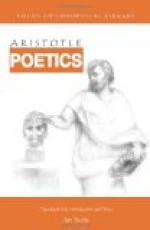Or again, by ambiguity of meaning,—as {pi alpha rho omega chi eta kappa epsilon nu / delta epsilon / pi lambda epsilon omega / nu upsilon xi}, where the word {pi lambda epsilon omega} is ambiguous.
Or by the usage of language. Thus any mixed drink is called {omicron iota nu omicron sigma}, ‘wine.’ Hence Ganymede is said ’to pour the wine to Zeus,’ though the gods do not drink wine. So too workers in iron are called {chi alpha lambda kappa epsilon alpha sigma}, or workers in bronze. This, however, may also be taken as a metaphor.
Again, when a word seems to involve some inconsistency of meaning, we should consider how many senses it may bear in the particular passage. For example: ’there was stayed the spear of bronze’—we should ask in how many ways we may take ‘being checked there.’ The true mode of interpretation is the precise opposite of what Glaucon mentions. Critics, he says, jump at certain groundless conclusions; they pass adverse judgment and then proceed to reason on it; and, assuming that the poet has said whatever they happen to think, find fault if a thing is inconsistent with their own fancy. The question about Icarius has been treated in this fashion. The critics imagine he was a Lacedaemonian. They think it strange, therefore, that Telemachus should not have met him when he went to Lacedaemon. But the Cephallenian story may perhaps be the true one. They allege that Odysseus took a wife from among themselves, and that her father was Icadius not Icarius. It is merely a mistake, then, that gives plausibility to the objection.
In general, the impossible must be justified by reference to artistic requirements, or to the higher reality, or to received opinion. With respect to the requirements of art, a probable impossibility is to be preferred to a thing improbable and yet possible. Again, it may be impossible that there should be men such as Zeuxis painted. ‘Yes,’ we say, ’but the impossible is the higher thing; for the ideal type must surpass the reality.’ To justify the irrational, we appeal to what is commonly said to be. In addition to which, we urge that the irrational sometimes does not violate reason; just as ’it is probable that a thing may happen contrary to probability.’
Things that sound contradictory should be examined by the same rules as in dialectical refutation whether the same thing is meant, in the same relation, and in the same sense. We should therefore solve the question by reference to what the poet says himself, or to what is tacitly assumed by a person of intelligence.
The element of the irrational, and, similarly, depravity of character, are justly censured when there is no inner necessity for introducing them. Such is the irrational element in the introduction of Aegeus by Euripides and the badness of Menelaus in the Orestes.
Thus, there are five sources from which critical objections are drawn. Things are censured either as impossible, or irrational, or morally hurtful, or contradictory, or contrary to artistic correctness. The answers should be sought under the twelve heads above mentioned.




